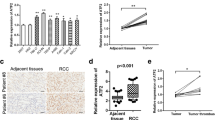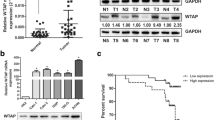Abstract
FBXW7 gene (F-box and WD-40 domain protein 7) is also named HCDC4 and is a significant tumor suppressor gene, which can regulate human cell cycle, proliferation and differentiation. In this study, we tend to investigate protein expression and related biological functions of FBXW7 gene. FBXW7 expression level in renal cell carcinoma (RCC) tissues is highly related to its clinical pathologic grade (P = 0.0094) and TNM phase (P = 0.0080) and is highly lower than in paracancerous normal tissues through immunohistochemistry study. FBXW7 high-expression patients have overall better prognosis than low-expression patients (P < 0.001). After transfected with FBXW7 plasmid, the RCC cell lines ACHN and A704 showed a depressed proliferation activity and high proportion of apoptosis through CCK8, colony formation and flow cytometry assay studies. By Western blot analysis, expression of cell proliferation-activating protein c-Myc and c-Jun is downregulated in FBXW7 high-expression RCC compared with negative control. These data suggested that FBXW7 is a significant tumor suppressor gene in RCC.





Similar content being viewed by others
References
Bonetti P, Davoli T, Sironi C, Amati B, Pelicci PG, Colombo E. Nucleophosmin and its AML-associated mutant regulate c-Myc turnover through Fbw7 gamma. J Cell Biol. 2008;182(1):19–26.
Nateri AS, Riera-Sans L, Da Costa C, Behrens A. The ubiquitin ligase SCFFbw7 antagonizes apoptotic JNK signaling. Science. 2004;303(5662):1374–8.
Anzi S, Finkin S, Shaulian E. Transcriptional repression of c-Jun’s E3 ubiquitin ligases contributes to c-Jun induction by UV. Cell Signal. 2008;20(5):862–71.
Isobe T, Hattori T, Kitagawa K, Uchida C, Kotake Y, Kosugi I, Oda T, Kitagawa M. Adenovirus E1A inhibits SCF(Fbw7) ubiquitin ligase. J Biol Chem. 2009;284(41):27766–79.
Kitagawa K, Hiramatsu Y, Uchida C, Isobe T, Hattori T, Oda T, Shibata K, Nakamura S, Kikuchi A, Kitagawa M. Fbw7 promotes ubiquitin-dependent degradation of c-Myb: involvement of GSK3-mediated phosphorylation of Thr-572 in mouse c-Myb. Oncogene. 2009;28(25):2393–405.
Fujii Y, Yada M, Nishiyama M, Kamura T, Takahashi H, Tsunematsu R, Susaki E, Nakagawa T, Matsumoto A, Nakayama KI. Fbxw7 contributes to tumor suppression by targeting multiple proteins for ubiquitin-dependent degradation. Cancer Sci. 2006;97(8):729–36.
Kanei-Ishii C, Nomura T, Takagi T, Watanabe N, Nakayama KI, Ishii S. Fbxw7 acts as an E3 ubiquitin ligase that targets c-Myb for nemo-like kinase (NLK)-induced degradation. J Biol Chem. 2008;283(45):30540–8.
Yokobori T, Mimori K, Iwatsuki M, Ishii H, Onoyama I, Fukagawa T, Kuwano H, Nakayama KI, Mori M. p53-Altered FBXW7 expression determines poor prognosis in gastric cancer cases. Cancer Res. 2009;69(9):3788–94.
Iwatsuki M, Mimori K, Ishii H, Yokobori T, Takatsuno Y, Sato T, Toh H, Onoyama I, Nakayama KI, Baba H, Mori M. Loss of FBXW7, a cell cycle regulating gene, in colorectal cancer: clinical significance. Int J Cancer. 2010;126(8):1828–37.
Minella AC, Clurman BE. Mechanisms of tumor suppression by the SCF(Fbw7). Cell Cycle. 2005;4(10):1356–9.
Hagedorn M, Delugin M, Abraldes I, Allain N, Belaud-Rotureau MA, Turmo M, Prigent C, Loiseau H, Bikfalvi A, Javerzat S. FBXW7/hCDC4 controls glioma cell proliferation in vitro and is a prognostic marker for survival in glioblastoma patients. Cell Div. 2007;2:9.
Akhoondi S, Sun D, von der Lehr N, Apostolidou S, Klotz K, Maljukova A, Cepeda D, Fiegl H, Dafou D, Marth C, Mueller-Holzner E, Corcoran M, Dagnell M, Nejad SZ, Nayer BN, Zali MR, et al. FBXW7/hCDC4 is a general tumor suppressor in human cancer. Cancer Res. 2007;67(19):9006–12.
Imura S, Tovuu LO, Utsunomiya T, Morine Y, Ikemoto T, Arakawa Y, Kanamoto M, Iwahashi S, Saito Y, Takasu C, Yamada S, Ishikawa D, Bando Y, Shimada M. The role of Fbxw7 expression in hepatocellular carcinoma and adjacent non-tumor liver tissue. J Gastroenterol Hepatol. 2014;29(10):1822–9.
Calcagno DQ, Freitas VM, Leal MF, de Souza CR, Demachki S, Montenegro R, Assumpcao PP, Khayat AS, Smith MDEA, dos Santos AK, Burbano RR. MYC, FBXW7 and TP53 copy number variation and expression in gastric cancer. BMC Gastroenterol. 2013;13:141.
Wei G, Wang Y, Zhang P, Lu J, Mao JH. Evaluating the prognostic significance of FBXW7 expression level in human breast cancer by a meta-analysis of transcriptional profiles. J Cancer Sci Ther. 2012;4(9):299–305.
Spencer CA, Groudine M. Control of c-myc regulation in normal and neoplastic cells. Adv Cancer Res. 1991;56:1–48.
Blick M, Westin E, Gutterman J, Wong-Staal F, Gallo R, McCredie K, Keating M, Murphy E. Oncogene expression in human leukemia. Blood. 1984;64(6):1234–9.
Toft DJ, Rosenberg SB, Bergers G, Volpert O, Linzer DI. Reactivation of proliferin gene expression is associated with increased angiogenesis in a cell culture model of fibrosarcoma tumor progression. Proc Natl Acad Sci USA. 2001;98(23):13055–9.
Guertin DA, Sabatini DM. An expanding role for mTOR in cancer. Trends Mol Med. 2005;11(8):353–61.
Xu Y, Tian C, Sun J, Zhang J, Ren K, Fan XY, Wang K, Wang H, Yan YE, Chen C, Shi Q, Dong XP. FBXW7-induced MTOR degradation forces autophagy to counteract persistent prion infection. Mol Neurobiol. 2015. doi:10.1007/s12035-014-9028-7.
Mao JH, Kim IJ, Wu D, Climent J, Kang HC, DelRosario R, Balmain A. FBXW7 targets mTOR for degradation and cooperates with PTEN in tumor suppression. Science. 2008;321(5895):1499–502.
Conflict of interest
None.
Author information
Authors and Affiliations
Corresponding authors
Additional information
Yu Fu, Youcheng Lin, Zhao Yang and Guosheng Yang have contributed equally to this work.
Rights and permissions
About this article
Cite this article
Fu, Y., Lin, Y., Yang, Z. et al. FBXW7 overexpression suppresses renal cancer cell proliferation and induces apoptosis. Med Oncol 32, 215 (2015). https://doi.org/10.1007/s12032-015-0656-1
Received:
Accepted:
Published:
DOI: https://doi.org/10.1007/s12032-015-0656-1




